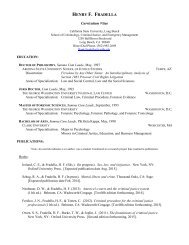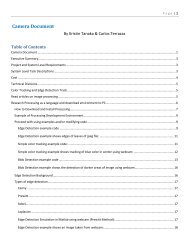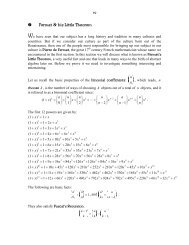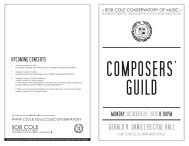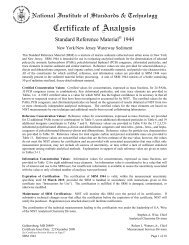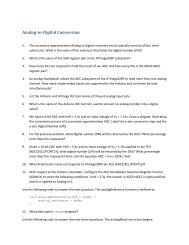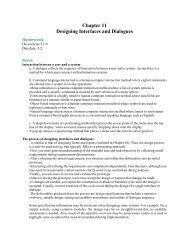Untitled - California State University, Long Beach
Untitled - California State University, Long Beach
Untitled - California State University, Long Beach
You also want an ePaper? Increase the reach of your titles
YUMPU automatically turns print PDFs into web optimized ePapers that Google loves.
After Eve submits to Adam, her relationship to the earth becomes<br />
more inward and concealed, suggesting that she is associated with lower<br />
level, physical productivity while Adam is connected with God and higher<br />
order productivity. Thus, both assume the most prevalent seventeenthcentury<br />
gender roles associated with men and women. Maus suggests that<br />
“Milton’s trope originates in an ambivalent wish to conflate intellectual<br />
originality with childbearing, while simultaneously implying that to<br />
identify the two processes is to confuse [the] carnal and spiritual” (93);<br />
while I concede that Milton correlates the intellectual with the physical,<br />
I disagree with the claim that carnality and spirituality are confused.<br />
Rather, they are separated according to gender, with woman being carnal<br />
and man being intellectual. Adam is presented as a beneficiary of the<br />
earth’s abundant warmth and embrace, while Eve is shown as enclosed<br />
within it and domestically subjected to Adam:<br />
Adam discerned as in the door he sat<br />
Of his cool bow’r while now the mounted sun<br />
Shot down direct his fervid rays to warm<br />
Earth’s inmost womb, more warmth than Adam needs.<br />
And Eve within, due at her hour, prepared<br />
For dinner Savory fruits of taste to please . . .<br />
(Milton V. 299-305).<br />
In this passage, Adam is presented as a mediating being, positioned on<br />
the boundaries of internal and external spaces. This physical positioning<br />
lends Adam the ability to partake in earthly comforts while also being<br />
visible, and accessible, to God. In contrast, Eve is not only enveloped<br />
by the earth and positioned within its “womb,” she is also serving Adam<br />
by performing domestic duties. Considering Wittig’s theory that gender<br />
roles are established via a relationship between men and women that is<br />
defined by domestic and reproductive obligations, one can see how Eve<br />
is doubly gendered female in this scene through her connection with the<br />
52 | Coleman<br />
womb and domesticity.<br />
Furthermore, Eve’s imitation of Adam demonstrates that she relies<br />
on him as a mediator between herself and God. After meeting Adam, Eve<br />
is denied direct access to God. Eve is conveniently absent during many<br />
of the moments when God or his angels relay information to Adam; for<br />
instance, in Book V Raphael warns to Adam alone about the imposing<br />
threat of Satan, and Eve is only given second hand information through<br />
Adam. Adam’s mediation is so apparent that when Satan first sees the<br />
human pair, he remarks that “Though both / Not equal as their sex not<br />
equal seemed / . . . / He for God only, she for God in him” (Milton IV.<br />
295-299). Eve’s access to God is interrupted by Adam, highlighting that<br />
separation from God is signified by difference, as it moves away from the<br />
intended, uniform ideal. Eve’s internalization of the separation from God<br />
is seen in Eve’s responses to Adam, wherein she calls him her “guide / And<br />
head” (Milton IV. 442-43), indicating that she views Adam as a mediator<br />
between herself and God. This mediation leads to gender difference<br />
and results in a gendered hierarchy and separation from God. Thus, as<br />
Schoenfeldt asserts, Adam and Eve show a “baffling blend of mutuality<br />
and hierarchy” (320), but the mutuality is not equally distributed as Eve<br />
is always subject to, and image of, both God and Adam, where Adam<br />
is only subjected to and imitative of God. The extra layer of mediation<br />
makes Eve an apt target for Satan, who sees this difference and separation<br />
as a weakness to exploit; thus, Eve is more susceptible to deception on<br />
account of the headship arrangement. Eve’s separation from God is<br />
further exemplified when she wakes from her tainted dream in Book V<br />
and admits that Adam is her “sole in whom [her] thoughts find all repose,<br />
/ [her] glory, [her] perfection” (Milton V. 28-29), as she is so removed<br />
from God that Adam has become God-like to her, defined as perfect and<br />
glorious.<br />
It is unsurprising, then, that Satan follows as Eve’s second mediator,<br />
Coleman | 53



